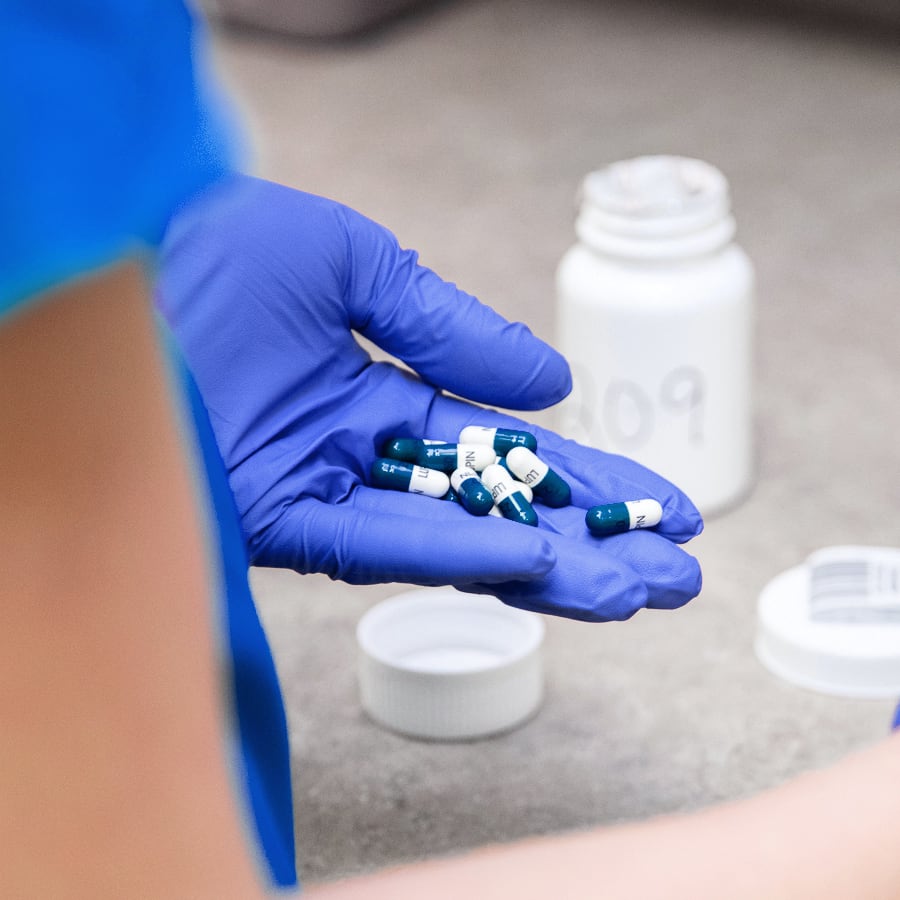Veterinary Internal Medicine
Diagnosis & Treatment of Internal Conditions
Veterinary internal medicine involves treating diseases and disorders of animals' internal systems.
Our team of skilled vets brings extensive experience in diagnosing and treating challenging cases, from disorders of the brain and nervous system to lung disease and cancers.
Thanks to our in-house lab, our team has a variety of diagnostic tools and treatment methods at our disposal.
We can manage patients with multiple diseases or disorders and offer effective treatment alternatives for those who do not respond well to standard procedures.

Internal Medicine Conditions
If your pet is exhibiting symptoms of an internal condition, your vet will conduct a comprehensive physical exam of your pet to diagnose the issue and create a detailed treatment plan customized to their needs.
Our veterinarians diagnose and treat ailments in the following areas:
- Cardiology (heart-related disorders)
Just like their pet parents, dogs and cats can suffer from heart diseases and disorders. Using the technology in our in-house vet lab, our veterinarians can examine your pet for signs of heart conditions so that you have results quickly. Fast results mean starting treatment sooner.
If your vet is unable to diagnose or treat your dog or cat's heart condition as part of our internal medicine checks, we will be sure to forward you to a board-certified internal medicine vet near Liberty Lake and work with your specialist to ensure that your pet receives the very best care.
- Reproductive Issues
Our team of veterinary professionals at Legacy Animal Medical Center in Liberty Lake understands the financial investment and personal commitment that go into breeding companion animals properly. If your animal is experiencing reproductive difficulties, our vets will work to diagnose the issue and offer appropriate treatment options to help resolve the problem.
- Immunology (immune system disorders)
Your pet's immune system is responsible for detecting foreign invaders or abnormal cells and beginning defensive action to protect the animal's health. That said, the immune system doesn't always work as it should, in which case your pet will be diagnosed with an immune-mediated disorder.
Common immune-mediated disorders in dogs and cats include anemia, arthritis, irritable bowel syndrome, hypothyroidism, allergies, and skin diseases.
- Pulmonary Disorders (diseases of the lungs)
Your pet's respiratory system does the essential work of delivering oxygen to the body and eliminating waste gases such as carbon dioxide. Because dogs and cats don't sweat the way people do, your pet's respiratory system also plays a key role in regulating body temperature.
There are a number of common pulmonary disorders seen in dogs, including chronic obstructive pulmonary disease (COPD), canine distemper virus, pneumonia, and lung tumors.
Common pulmonary disorders in cats include asthma, bronchitis, parasitic worms, bacterial infections, and viruses.
- Gastroenterology (digestive organs)
Gastrointestinal (GI) disorders are a common internal medicine issue seen by our Liberty Lake veterinarians. GI conditions affect your pet's stomach and intestines, interfering with the animal's ability to digest food properly and absorb nutrients.
Pets suffering from GI problems often experience symptoms such as blood in stool, constipation, diarrhea, vomiting, gas, abdominal pain, loss of appetite, and weight loss.
- Oncology (tumors and cancer)
Cancer is a disease that can impact even the fittest humans and animals. When diagnosed in the earliest stages, in many cases cancers in dogs and cats can be treated with a combination of surgeries, therapies, and other methods.
Some of the most common cancers in dogs include mast cell tumors, melanoma, lymphoma, and bone cancer. In cats, some of the most common cancers include lymphoma, feline leukemia virus (FeLV), mammary cancer, and skin cancer.
If your pet requires diagnosis or cancer care beyond the scope of our skilled veterinarians, we will refer you to a veterinary oncology specialist near Liberty Lake.
- Urology (urinary functions, genitourinary tract)
Veterinary internal medicine also covers urology conditions such as urinary tract infections (UTIs) in dogs and feline lower urinary tract disease (FLUTD) in cats.
Your pet's urinary tract consists of their kidneys, the tubes that carry urine to the bladder, the bladder, and the urethra that conducts urine out of your animal's body. Urinary tract disorders can affect any part of this system.
- Endocrinology (glands and their functions)
Essential hormones are secreted into your pet's body thanks to the hard work of a number of glands. These glands and hormones are your pet's endocrine system. When your pet's endocrine system isn't working the way it should, symptoms can include skin problems and poor coat condition.
Our vets offer diagnoses and treatments for a range of hormonal issues in dogs and cats.
- Neurology (brain and nervous system disorders)
Neurology is a branch of veterinary internal medicine covering conditions of the brain and spinal cord, as well as neuromuscular dysfunction. Some of the most common neurological disorders in dogs and cats include seizures, IVDD, and tumors.
If your animal requires diagnoses or care for neurologic conditions that are beyond the scope of our experienced veterinarians, we will be happy to refer you to an animal internal medicine specialist or veterinary neurologist near Liberty Lake. Our vets will work closely with your specialist to ensure that your pet receives the best treatment possible.
Specialist Referrals
Your pet's health and wellbeing are our highest priority.
If your companion animal needs a procedure or expertise that we do not offer here at Legacy Animal Medical Center, we will refer you to a veterinary internal medicine specialist near Liberty Lake.
Laboratory & Diagnostics
We support our comprehensive approach to dog and cat internal medicine with advanced testing, imaging and other diagnostic procedures.
Our in-house veterinary lab is equipped with the tools and technology our team needs to diagnose your pet's internal medicine condition efficiently and accurately so that treatment can begin as soon as possible.
